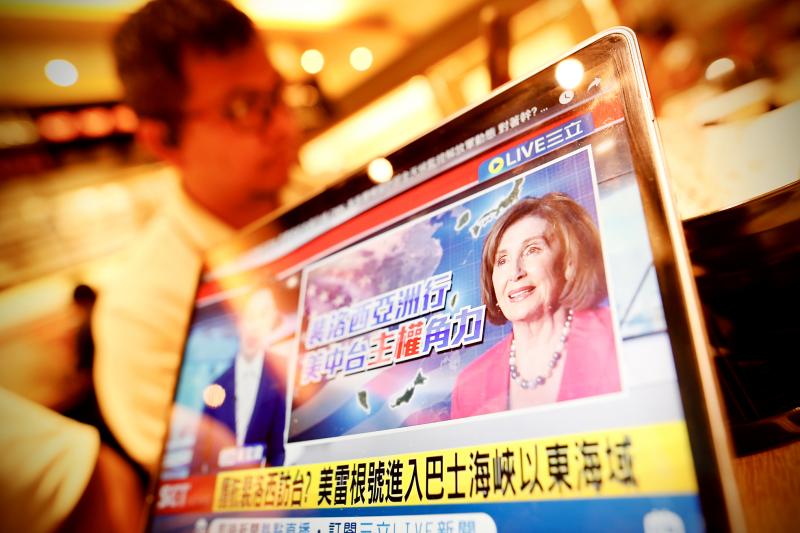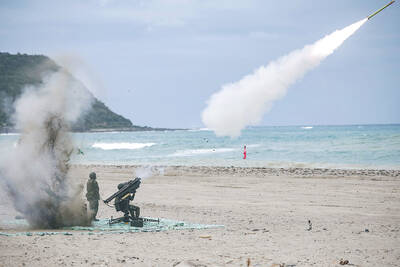Thirty-one years ago, a relatively new congresswoman from California surprised Chinese authorities when she unfurled a banner in Beijing’s Tiananmen Square dedicated to the pro-democracy student activists massacred there.
Now the US House of Representatives Speaker, Nancy Pelosi, is poised to travel to Taiwan during a tour of Asia nations this week, once again defying Beijing at a moment of extraordinary tension between the US and China — but also creating a host of problems for President Joe Biden.
LEGACY

Photo: EPA-EFE
The highly anticipated diplomatic mission caps a foreign policy career defined by what she views as an unwavering defense of human rights and democratic values abroad. It is a posture, sharpened over decades in Congress, that has made her a target of criticism in Beijing and, at times, put her at odds with leaders of both parties in Washington.
A visit by the House speaker, second in the presidential line of succession, would make Pelosi the highest-ranking US official to visit the self-governing island in a quarter-century. China, which claims Taiwan as its own province, has threatened unspecified consequences for the US should Pelosi make the trip.
Pelosi has declined to confirm a visit, citing security concerns. But a stop in Taipei is now widely expected and has been confirmed to media outlets by officials in the US and Taiwan. The Financial Times reported that Pelosi had been scheduled to travel to Taiwan in April but tested positive for COVID and postponed it for August.
Asked recently about her interest in traveling to Taiwan, the 82-year-old lawmaker nodded to her own background representing San Francisco, where roughly one in three residents are of Asian descent.
“We have global responsibilities, whether it comes to three things, I always say: security, economy and governance,” she told reporters at her news conference last week. “This will be part of that.”
The sharp warnings from Beijing, implying that the visit could provoke a military response from China, have Washington on high alert. The US military has made preparations to protect Pelosi during the visit, while officials scramble to interpret Beijing’s saber-rattling.
There are also serious domestic risks, as Pelosi’s party faces a difficult re-election in November with her gavel in the balance and Biden desperate to generate positive headlines about his economic agenda — not foreign troubles.
Republicans are urging Pelosi to go, and ready to accuse Democrats of bowing to Beijing if she doesn’t. The focus on Pelosi’s travel, during the House’s autumn recess, also threatens to distract from a string of Democratic legislative victories at home.
Biden is preparing to sign a bill that would spend hundreds of billions of dollars designed to give the US a manufacturing and technological edge over China. And a surprise deal with a Democratic holdout revived Biden’s economic agenda, thought to be doomed just weeks ago.
‘CAN’T BACK DOWN’
The last speaker to lead a delegation to Taiwan was the Republican Newt Gingrich in 1997. Appearing on Fox News, Gingrich said he hoped Pelosi would make the trip.
“Once it’s public, you can’t back down,” Gingrich said. “You have to stand up to the Chinese communists or they will interpret it as a sign of weakness and they’ll grow even more aggressive.”
At a press conference in July, Biden said that “the military thinks it’s not a good idea right now” for Pelosi to travel. At a White House briefing on Monday, National Security Council spokesman John Kirby said no one in the administration sought to change her mind about the trip and that the US would ensure she has a “safe and secure” visit should she go through with it. “The speaker makes her own decisions,” he said.
Pelosi has long been one of the most strident and outspoken critics of China, a position that has in the past allied her with conservatives. She opposed China’s bid to host the summer Olympics in 2008 and has pushed the US to leverage its economic power to improve human rights and labor protections in China. Her advocacy helped ensure oversight of China when it joined the WTO.
During a visit to China in 2009, Pelosi hand-delivered a letter to the then president, Hu Jintao (胡錦濤), demanding the release of political prisoners.
“She’s not viewing Taiwan through the lens of what’s happening right now,” said Daniel Silverberg, a former foreign policy adviser to House Democratic leadership. “She’s viewing it through the lens of a 30-year history of activism.”
Silverberg said Pelosi’s tour of Asian nations was consistent with her view that Congress, as an independent branch of the government, has an important role to play on the world stage. In recent years, Pelosi has emerged as a world leader in her own right, meeting frequently with heads of state to discuss global challenges, the climate crisis chief among them. During the Trump years, her diplomacy took on an even greater prominence as a high-profile counterweight to the former president’s isolationism.
She recently met with the president of Ukraine, Volodymyr Zelenskiy, in Kyiv and traveled to the Vatican where she met Pope Francis.
A possible Taiwan visit must “be seen through Pelosi’s view: this is not just symbolism,” Silverberg said. “This is a critical exercise of Congress and concomitantly US foreign policy power and the power of the moral bully pulpit.”
RIGHT PERSON
Pro-democracy advocates eager to see Pelosi visit the island say her long history of standing up to China sends a powerful message at a pivotal moment.
“The speaker is not only the highest-ranking person who can take this trip, I also think she is the right person to take this trip,” said Samuel Chu (朱牧民), president of the Campaign for Hong Kong, a Washington-based advocacy group.
Chu, whose father is a prominent human rights activist and met with Pelosi when she visited Hong Kong decades ago, said the 1991 trip to Tiananmen Square had been “formative and foundational” to her career.
Two years after Chinese troops with tanks crushed a pro-democracy demonstration in Tiananmen Square, Pelosi visited the site of the massacre alongside two other members of Congress. Standing in the square, teeming with tourists and international media, they unfurled a black banner that read: “To those who died for democracy in China.” The act surprised security officials and the lawmakers were briefly detained.
Chu said that was the beginning of decades of advocacy that has shaped her view of US foreign policy, pointing to a version of the line she often repeats when asked about China. “If we don’t speak out against human rights violations in China for commercial reasons,” Pelosi has said, “we lose all moral authority to speak out for human rights anywhere.”
Much of her diplomatic leadership has been relational, said Chu. She has forged a close relationship with the Dalai Lama, whom she presented with the Congressional Medal of Honor. In 2019, she drew Beijing’s ire when she welcomed Hong Kong dissidents and was behind the push to confront the atrocities committed against the Uyghurs in China’s western Xinjiang region, which the US government now officially recognizes as a genocide.
Chu sees those relationships, built over the arc of her career, as a compelling factor in her decision to visit the island.
“This has to ultimately be about the aspirations of the Taiwanese people,” Chu said. “And the only way to not cut them out is to be there and to know them and to make that a central part of US-China policymaking.”

In late October of 1873 the government of Japan decided against sending a military expedition to Korea to force that nation to open trade relations. Across the government supporters of the expedition resigned immediately. The spectacle of revolt by disaffected samurai began to loom over Japanese politics. In January of 1874 disaffected samurai attacked a senior minister in Tokyo. A month later, a group of pro-Korea expedition and anti-foreign elements from Saga prefecture in Kyushu revolted, driven in part by high food prices stemming from poor harvests. Their leader, according to Edward Drea’s classic Japan’s Imperial Army, was a samurai

The following three paragraphs are just some of what the local Chinese-language press is reporting on breathlessly and following every twist and turn with the eagerness of a soap opera fan. For many English-language readers, it probably comes across as incomprehensibly opaque, so bear with me briefly dear reader: To the surprise of many, former pop singer and Democratic Progressive Party (DPP) ex-lawmaker Yu Tien (余天) of the Taiwan Normal Country Promotion Association (TNCPA) at the last minute dropped out of the running for committee chair of the DPP’s New Taipei City chapter, paving the way for DPP legislator Su

It’s hard to know where to begin with Mark Tovell’s Taiwan: Roads Above the Clouds. Having published a travelogue myself, as well as having contributed to several guidebooks, at first glance Tovell’s book appears to inhabit a middle ground — the kind of hard-to-sell nowheresville publishers detest. Leaf through the pages and you’ll find them suffuse with the purple prose best associated with travel literature: “When the sun is low on a warm, clear morning, and with the heat already rising, we stand at the riverside bike path leading south from Sanxia’s old cobble streets.” Hardly the stuff of your

April 22 to April 28 The true identity of the mastermind behind the Demon Gang (魔鬼黨) was undoubtedly on the minds of countless schoolchildren in late 1958. In the days leading up to the big reveal, more than 10,000 guesses were sent to Ta Hwa Publishing Co (大華文化社) for a chance to win prizes. The smash success of the comic series Great Battle Against the Demon Gang (大戰魔鬼黨) came as a surprise to author Yeh Hung-chia (葉宏甲), who had long given up on his dream after being jailed for 10 months in 1947 over political cartoons. Protagonist